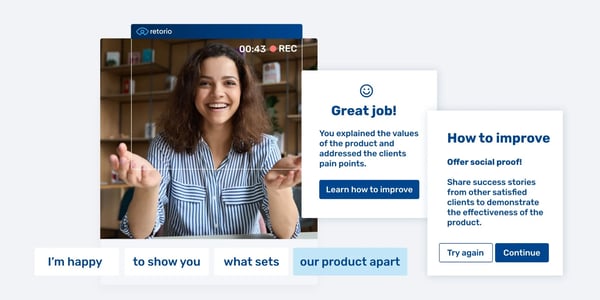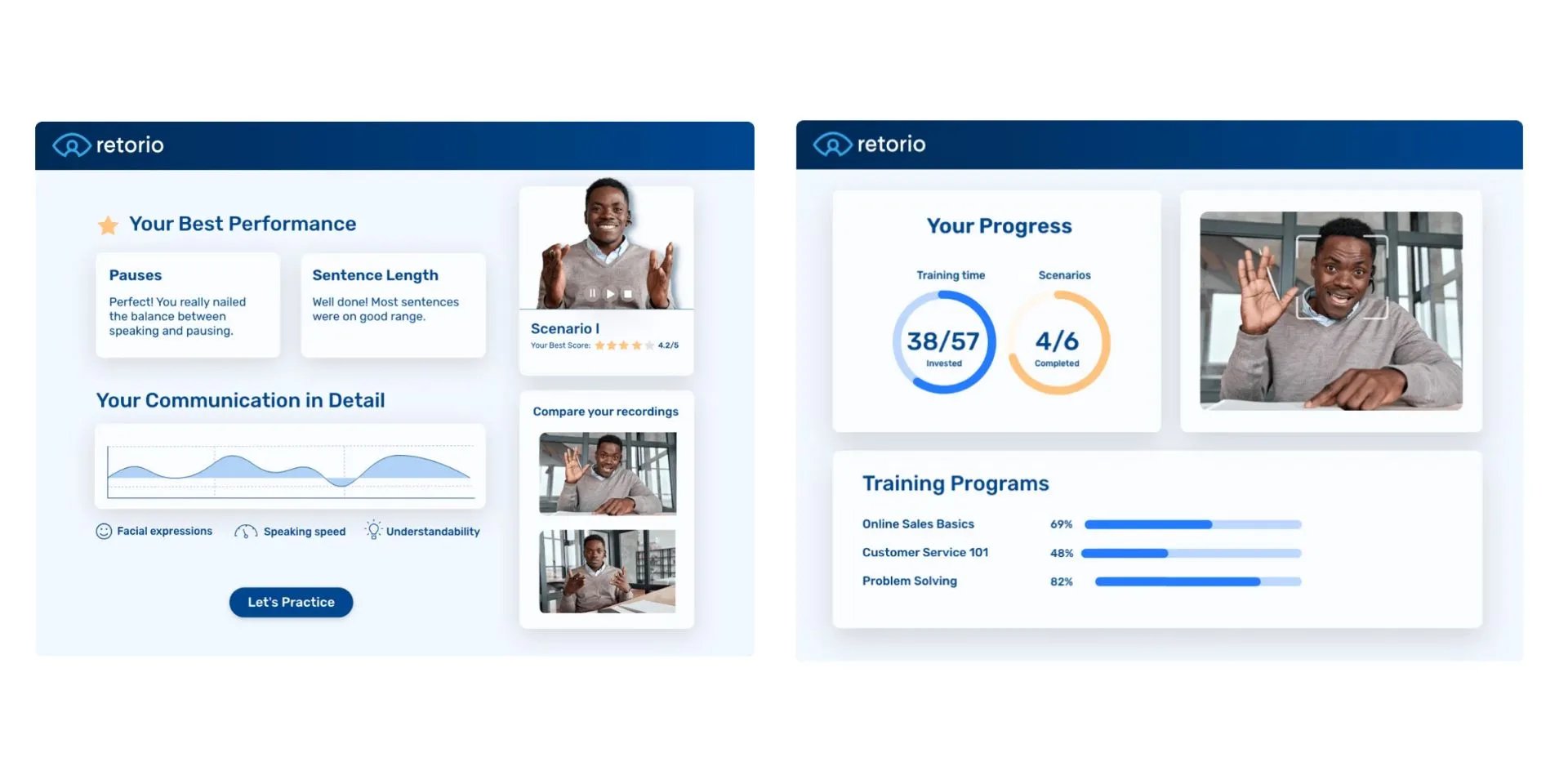2023 was the year that artificial intelligence (AI) witnessed remarkable advancements. From developing personalized coaching and delivering personalized insights to developing coaching sessions that feature a conversational AI coach, 2023 was a pivotal year for integrating AI into various aspects of the business landscape.
As we now have entered 2024, the horizon for AI appears to be even more promising, with further innovation and advanced technologies to be unleashed.
The AI market is projected to grow by 33% in 2024 with the AI market size projected to grow at least 120% year over year.
One of these advancements is AI coaching. From coaching employees to reach their professional goals and develop new skills to generating personal development plans, several organizations across industries have stepped away from the traditional coaching approaches.
Just like the saying: it's out with the old, and in with the new, this blog post will explain to you why you need AI coaching and what it is all about.
What's in this post:
What is AI coaching?
AI coaching refers to the use of artificial intelligence technologies to develop and provide personalized coaching support and guidance for individuals in their professional and personal development. AI coaching leverages machine learning to provide a more customizable and scalable approach to employee development that includes tailored feedback, recommendations for continuous improvement, and learning plans.
AI coaching enables organizations to help employees achieve their short and long-term career goals and overcome challenges effectively and efficiently. Moreover, companies are able to benefit from AI tools that will help them streamline the coaching process and achieve desired training outcomes much faster.
Essentially, companies use AI technology to gain valuable insights into the training and coaching needs of each individual. Organizations can then quickly identify the strengths and areas for improvement of each employee and see how they can effectively nurture the talents and bridge skill gaps for an overall improved employee experience.
What is a conversational AI coach?
A conventional AI coach is a form of Artificial Intelligence that can mimic human communication. Conversational AI is powered by the usual branches of AI which is a combination of Natural Language Processing (NLP), foundation models, and machine learning (ML).
Large volumes of data, such as text and audio, are used to train conversational AI systems to mimic human communication. The data is utilized to train the algorithm to recognize and comprehend human language. The technology then uses this knowledge and information to interact naturally with humans.
It is continually learning from its interactions and increasing the quality of its responses and decision-making over time, becoming more accurate and reliable as more data continues to be processed and analyzed.
Some examples of conversational AI are the following:
- Chatbots
- Virtual assistants
- Speech recognition software
- Generative AI agents
- Speech recognition software

Why you need an AI coaching program
The pursuit of personal and professional development is a continuous road for everyone. The road is often filled with challenges and milestones to reach that can sometimes seem like an ongoing struggle for most.
However, the world of training and coaching does not have to be all that difficult. Organizations should be able to improve their overall leadership style, help employees develop positive habits in the workplace, make better-informed decisions, and improve overall employee well-being. There's more to it. Here are five reasons why you shouldn't wait any longer to implement AI-powered coaching in your company:
Develop personalized development journeys
A large part of an organization's success lies within the skills and competencies of each employee. Therefore, companies must nurture these talents efficiently and help them to move forward in their professional development.
The question, however, is how can companies do this. The answer is AI coaching. When looking into achieving your desired outcomes whether it is the number of calls your sales teams achieve within a month or how you can enhance your leaders' leadership skills to improve employee engagement and retention, finding a coach that can target each individual's specific needs can be a challenge.
You can think of AI coaching as having an outfit that is measured perfectly to your size. AI coaching allows each member of the team to receive targeted training based on data-driven insights that highlight each employee's unique strengths, weaknesses, learning styles, and preferences.
Moreover, AI coaching continuously optimizes each employee's growth trajectory, which saves you the time and resources that go into traditionally measuring employee performance, and learning needs.
Continuous learning culture
Cultivating a company culture of continuous learning is vital, especially as the world of L&D continues to evolve and change in 2024. To stay ahead of the curve, and keep your competitive edge, AI coaching programs can provide ongoing, real-time feedback to every training and keep employees driven to achieve their goals and be open to continuously learning new skills.
A motivated team will generate top results. Therefore, AI coaching can help you keep your employees on top of their game by providing tailored training recommendations that are catered to their career goals and professional development. This encourages employees to embrace a mindset of continuous improvement.
Moreover, AI coaching facilitates goal setting by helping employees set SMART goals and track their learning objectives and performance progress. This process allows individuals to establish achievable and measurable milestones, and monitor their improvement over time.
Not only does this allow your employees to see how they are progressing professionally, but it also encourages a sense of accountability and motivation which in turn, cultivates a culture where employees continuously seek opportunities for learning and growth.
Increase efficiency and scalability
The difference between traditional coaching methods versus. AI coaching is that AI coaching automates tasks, minimizes errors, and uses data to be the starting point of creating all training experiences, meaning that AI coaching analyzes large amounts of data to provide personalized guidance and coaching to each employee based on their unique needs and where they are in their development journey.
AI coaching takes on a targeted approach to ensuring that organizations can extend their benefits across diverse teams and accommodate the developmental needs of an entire workforce without wasting unnecessary time and overspending resources.
Instead of having a human coach, AI coaching sessions use an artificially intelligent coach that helps employees bring out their true potential through conversations based on real-life situations that reflect circumstances that employees deal with in their respective roles.
The automation of this coaching routine allows employees to flexibly fit coaching into their work routine and enables organizations to level up employee experience and development in a cost-effective and scalable manner.
Make better data-driven decisions
Another reason why you need AI coaching is that it empowers you to make more informed decisions driven by data. The data generates valuable insights from the analysis of employee performance data and screens the learning patterns and styles of each employee.
Through its advanced technologies, AI coaching helps organizations by extracting actionable information to identify learning and development trends, pinpointing skill gaps, and evaluating the effectiveness of coaching sessions.
What's more, the data-driven approach that comes with AI coaching enables you to align your coaching efforts with your overarching business goals so that each employee can successfully contribute to the success of the organization.
By leveraging the power of data, AI coaching facilitates a more strategic and impact approach to employee development and ensures that all efforts are grounded in evidence and tailored to each individual's needs in the workforce and fit into where they are in their development journey.
Accessibility and flexibility
AI coaching can be accessed from anywhere in the world, on any smart device that has a working WiFi. Especially in this day and age where people are often traveling, or on the go, it can be hard to pin down human coaches and have coaching sessions take place within the office.
As the hybrid work model is taking the lead in 2024 and for the years to come, organizations need to take that into account and find ways for their employees to still take part in coaching and stay consistent on their growth journey.
This year, it is time to say goodbye to in-office training that may not suit every individual's work schedule. Remote employees may prefer to complete their coaching sessions online, while other employees would prefer to schedule their coaching sessions when it suits them.
Being able to provide such accessibility and flexibility with AI coaching is important if you are looking into bringing your employee's development journey two steps forward instead of one. Think of it like this: the simpler the coaching process is, the more motivated and driven your employees will be to bring forth their professional development.

The coaching industry is evolving as quickly as modern technology does. Therefore, the future of learning and development will focus more on the human experience, with an emphasis on experience.
To stay ahead of the curve and keep your competitive edge, implementing AI-driven processes to elevate your development and training programs is key to not only cultivating top-performing employees but also retaining top talent.
Are you searching for a coaching and training platform that offers personalized development plans and coaching powered by Artificial Intelligence? Retorio's behavioral intelligence platform has it covered. From building your own AI coaching platform within minutes to targeting the skill gaps and needs of each of them, Retorio's AI-powered platform harnesses the power of behavioral intelligence to make learning and development effective and scalable.

Your ticket to higher coaching completion rates and improved employee engagement and performance rates await you. Try Retorio's AI-powered platform for yourself and implement training that matters for your business's success.
FAQ's related AI coaching
An AI training model is a computational system that is built to learn and make decisions by processing large amounts of data. In the case of AI coaching, an AI training model is responsible for analyzing vast amounts of data about each employee to curate a personalized development plan for each person. A common type of AI training model includes machine learning that identifies patterns and skill gaps.
The four different types of learning in AI include:
-
Supervised learning: Trained to predict or classify new data accurately.
-
Unsupervised learning: Discovering new patterns or structures within unlabeled data and clusters similar items together.
-
Semi-supervised learning: When the machine uses small portions of labeled data and a larger portion of unlabeled data to train a predictive model.
-
Reinforcement learning: This is a sub-branch of machine learning that focuses on decision-making. To make a decision, it learns from its environment and figures out how to obtain maximum reward.
AI coaching is defined as a machine-assisted, systematic process designed to help individuals set professional goals and efficiently achieve them. It leverages AI learning based on data and operates without human guidance, adapting and becoming more efficient through the analysis of extensive coaching process datasets.
Key aspects and benefits of AI coaching:
- Data-Driven Recommendations: AI coaching provides recommendations supported by video footage and empirical evidence, moving away from the subjective experiences and intuition used by traditional coaches.
- Quantifiable Impact: AI coaching quantifies behavioral changes, validates recommendations, and optimizes effectiveness, providing sponsors with empirical evidence to justify investments.
- Unbiased Recommendations: AI coaches focus on behavior, disregarding demographics such as age, gender, or ethnicity, to provide equitable feedback.
- Data Privacy: AI coaching offers end-users control over their data, allowing them to easily delete private information.
- Psychological Safety: AI coaching provides a safe environment for users, particularly those with lower self-efficacy beliefs, to receive feedback without fear of negative impacts on their image.
- Scalability and Democratized Access: AI coaching can be scaled to reach millions simultaneously at low costs, making coaching more accessible than traditional methods that are often limited to executives or sales representatives.
- Standardization: AI coaches offer consistent, high-quality coaching for all, ensuring an equal environment with personalized insights. Coaching sponsors can ensure quality standards and unify behaviors within their organization.
- Economies of Learning: AI coaches learn from a vast knowledge pool, identifying and sharing best practices globally to enhance organizational performance.
- Flexibility and Speed: AI coaches can quickly adapt to changing industries and coaching needs, eliminating the need for extensive trainer programs.
- Immersion: AI coaches seamlessly integrate into existing workflows and facilitate authentic role-plays and simulations by simulating various client profiles and professional counterparts.
Retorio's AI coaching platform exemplifies these capabilities by providing measurable, impactful, and scalable training solutions. The platform combines AI with insights from behavioral research, offering features such as:
- Custom Coaching Simulations: Training administrators can use generative AI models to create custom coaching simulations tailored to specific situations and products.
- AI Coaching Models: These models analyze learner interactions to quantify, interpret, and prescribe behavior based on video analysis, identifying winning behaviors and building benchmarks.
- AI Coaching Impact Reporting: These models deliver valuable insights into learner engagement and training impact for training administrators.
AI coaching represents a paradigm shift in professional development, offering a data-driven, scalable, and personalized solution to the limitations of traditional coaching methods. It helps make behavior measurable and describable, building more data-driven learning systems.
The benefits of AI coaching include:
• Personalization: Tailored guidance to individual needs and learning styles.
• Accessibility: On-demand support available anytime and anywhere.
• Scalability: Ability to reach a large number of individuals without additional human coaches.
• Real-time feedback: Immediate insights allowing for prompt adjustments.
• Continuous improvement: Tracking progress over time to facilitate ongoing development.
• Cost-effectiveness: Often more affordable than traditional coaching methods.
AI coaching can address skills gaps in enterprise organizations by providing personalized, scalable, and data-driven training solutions. It ensures employees acquire necessary skills to meet organizational goals.
AI coaching addresses skills gaps through:
- Personalized Learning Experiences AI coaching offers personalized and interactive learning experiences tailored to individual needs. Adaptive algorithms and real-time feedback engage learners effectively, fostering higher interest and participation.
- Scalability and Accessibility AI coaching enables organizations to scale their training programs, reaching a wider audience than traditional methods. It democratizes access to coaching, making it available to thousands of employees simultaneously at a lower cost.
- Data-Driven Insights AI coaching delivers targeted, data-driven insights that address specific learning gaps. AI identifies winning behaviors and benchmarks to describe and predict performance drivers.
- Customized Content Generation Training administrators can use generative AI models to create custom coaching simulations tailored to specific situations and products. This allows training to be directly relevant to the specific needs of the organization and its employees.
- Objective Assessment AI coaches focus solely on behavior, disregarding demographics such as age, gender, or ethnicity, ensuring unbiased recommendations.
- Consistent Training Quality AI coaching provides consistent, high-quality coaching for all learners, creating an equal environment with personalized insights. This ensures that all employees receive the same level of instruction, which may not be the case with human coaches.
- Real-Time Monitoring and Feedback AI offers comprehensive real-time monitoring and precise, data-driven feedback. This allows employees to understand their strengths and weaknesses and focus on areas needing improvement.
- Integration into Workflows AI coaching can be integrated into digital workflows, such as CRM or HRM systems, to enhance recommendations and track performance improvements, validating coaching effectiveness.
- Improved Knowledge Retention Personalized approaches accelerate skill development and boost knowledge retention. Regular engagement and repeated sessions reinforce learning, ensuring long-term impact.
- Address specific needs: Detailed reports on individual behavioral improvements (or gaps). Real-time analysis of behavioral capabilities and change.
By leveraging these capabilities, AI coaching helps organizations identify and close skill gaps effectively, leading to improved employee performance and better business outcomes. It helps align training results with business metrics and strategic objectives, proving its true ROI.
AI can significantly improve internal communications and training by providing personalized, scalable, and data-driven solutions. It addresses many of the limitations of traditional methods, enhancing engagement, effectiveness, and overall business impact.
AI Enhancement of Internal Communications:
- Personalized Communication: AI can tailor communications to individual employee needs and preferences, increasing engagement and ensuring that important information is not overlooked.
- Improved Engagement: By offering personalized and interactive experiences, AI can foster higher levels of interest and participation in company-wide initiatives.
- Bias-Free: AI provides impartial communication, unaffected by biases, ensuring equitable dissemination of information.
AI Enhancement of Training
- Personalized Learning: AI delivers targeted, data-driven insights that address specific learning gaps. This ensures training is efficient and impactful, as it focuses on the unique needs of each employee.
- Scalability and Accessibility: AI can train multiple learners simultaneously without additional costs. This makes training more accessible to a wider range of employees, regardless of their location or schedule.
- Consistent Quality: AI provides uniform training quality, ensuring all learners receive the same level of instruction. This eliminates the variability often seen with human trainers.
- Real-Time Monitoring and Feedback: AI offers comprehensive, real-time monitoring and precise, data-driven feedback. Employees understand their strengths and weaknesses and focus on areas needing improvement.
- Custom Content Generation: AI can generate custom coaching simulations tailored to specific situations and products. This allows training to be directly relevant to the specific needs of the organization and its employees.
- Objective Assessment: AI focuses solely on behavior, disregarding demographics, which ensures unbiased recommendations.
- Integration into Workflows: AI coaching can be integrated into digital workflows to enhance recommendations and track performance improvements, validating coaching effectiveness.
- Improved Knowledge Retention: Personalized approaches accelerate skill development and boost knowledge retention. Regular engagement and repeated sessions reinforce learning, ensuring long-term impact.
Specific Roles and AI Benefits:
- Heads of Sales Enablement: AI offers scalable reach to all learners and quick implementation of different topics for different learning groups. It also enables easier selection and prioritization of measures because the effect on skills required in the business is demonstrable.
- Heads of L&D: AI provides scalable reach and quick implementation of training topics and easier selection of measures based on their impact on business skills.
- Program Managers/Trainers: AI provides pre-suggested frameworks and best practices for different roles and target groups. It also allows for automatic integration of company-specific material into learning concepts.
- Learners: AI offers relevant training with personalized feedback, boosting confidence in a safe setting.
Overall Impact:
- Addresses Skills Gaps: AI coaching can effectively address skills gaps within organizations by providing personalized, scalable, and data-driven training solutions.
- Increases Engagement: AI coaching has shown high voluntary participation rates and recommendation rates significantly above industry standards.
- Quantifiable Improvements: Studies indicate that AI coaching can lead to measurable improvements in behavior and business outcomes.
- Cost-Effective: AI coaching reduces the need for human intervention, lowering costs and enabling scalability.
AI coaching represents a shift in how organizations approach internal communications and training, by ensuring a more engaged, skilled, and aligned workforce.



